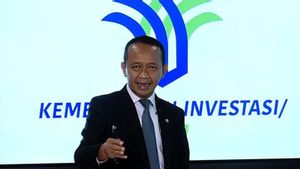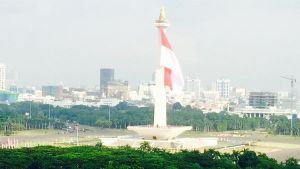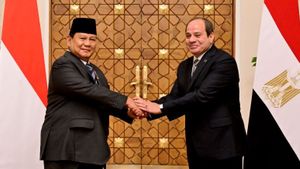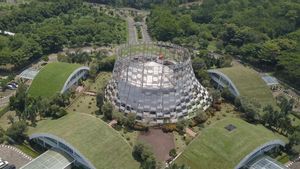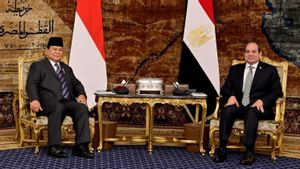JAKARTA - In the past, a land could be measured based on the number of raising cows or types of plants that could be planted, but after centralization, the area of land was measured in hectares. Not only that, the introduction of permanent last names in the European continent is a standard size unit to state that social order reconfigurations are needed for state oversight.
Both sentences are quotes from a book by James C. Scott entitled "Seing Like State". Books that see like a country: How Certain Schemes to Improve Human Conditions Have Failed.
Scott bravely criticized the system of trust he called high modernism., which centers on overconfidence of a head of state against the ability to design and operate society as needed.
This book emphasizes how countries seek to impose reading' on their subjects by homogenizing and creating standards that simplify existing, natural, and diverse social order. According to Scott, the central role played by the state is needed for programs such as disaster response or vaccination.
SEE ALSO:
Scott explores the weaknesses of city planning and very modern social engineering, arguing that this approach often yields unsustainable results and reduces autonomy and human skills. He also compares the rigid and centralized high-modernism design with the diverse and adaptable nature of institutions formed by practical wisdom.
Examples of Scott's critical statements include agriculture, urban planning, and the economy. All of them are used to illustrate how a rigid and top-down approach can lead to environmental degradation, social dislocation, and loss of reason as motors of human role.
The Seed Like State book seems to have transformed into a strategic and large-scale project, the capital city of the archipelago in East Kalimantan. President Jokowi's desire to move the capital city from Jakarta to the archipelago in East Kalimantan shows the courage combined with high accuracy. This is because this nation has never built a successful city from vacant land. Re-configurating an area will have an impact on social order in local communities.
Academics Nanyang Technological University (NTU) Singapore, Sulfikar Amir also reminded that Indonesia does not yet have experience in building a city out of vacant land. Therefore, the development of IKN Nusantara is a big challenge so it needs accuracy.
He saw that the development of the Nusantara IKN was a large-scale and expensive-valued project, so it had a high level of risk of failure. Sulfikar said that a number of large-scale projects that ended up failing due to several factors. One of them is the vision of leaders or political elites who when they want to be realized, are not in accordance with the reality that exists in society.
He hopes that such things must be learned carefully and wisely by the government. Especially when the government is making large-scale development efforts that involve a lot of money and are carried out in the long term.
"Therefore, we must be careful and have a lot of things that we can learn, not only from what we have done but what other countries have done. We must be objective to see the problems, without having to try to cover up the problem, because maybe we once wanted to be open to state that the projects being carried out have not been carried out properly," explained Sulfikar.
Sulfikar also regrets the transfer to IKN which still uses intuition or ideas based on instincts, without involving logical thoughts or considerations, without the measurable rationality used by the government.
"Unfortunately, the rationality of the transfer of IKN is still intuitive. So, there is no measurable rationality used by the government to say, 'Okay, First Lady, we move it to East Kalimantan for this reason and that'. Then there is empirical evidence, there are theoretical and analytic studies so that everyone agrees,' he explained.
The Mode Is Not Burdening The State Budget
The Chancellor of UMJ, Ma'mun Murod Al-Barbasy said, if the problem is the unequalness and dominance of development in Java, the answer is certainly not by moving the nation's capital. On the contrary, it should be answered by reducing the inequality of development between Java and outside Java, equitable development in areas outside Java. Partly to Sumatra, Kalimantan, Sulawesi, Papua, and other areas outside Java.
"If the reason is because they want to have a national capital that represents the identity of the nation, diversity, and appreciation of Pancasila, is Jakarta considered not or lacks characterizing the identities of the nation, diversity, and the appreciation of Pancasila? Otherwise, what indicators are used to assess Jakarta as not or less characterizing these three things," he said.
In addition, the portion of IKN financing, which uses the state budget more is certainly not in line with the promises made by President Jokowi in May 2019, when he first announced the capital relocation project, which stated that the construction of the nation's capital would not burden the state budget.
Ma'mun revealed that the mode of not burdening the state budget' is similar to the Jakarta Bandung high-speed rail project, which at first the government also stated that it would not burden the state budget, but in fact it also burdened the state budget of Rp. 4.3 trillion. Whereas previously, the financing of this high-speed train had also experienced an increase in costs from the previous Rp. 86.67 trillion to Rp. 114, 24 trillion.
Not to mention when talking about the drafting process until the ratification of the IKN Law which only took 42 days. This is like emphasizing the same tendency so far that in the process of making several laws relating to the interests of the oligarchs, such as the Minerba Law and the Job Creation Law, the ratification is always almost similar: full of controversy, ignoring input from many parties, the discussion is very fast, and passed before or midnight," he said.
He emphasized that without the political will and political act to change development policies from Javanese-centric models, the city of thecentric city, there would be no equitable development in Indonesia. Therefore, relocating the nation's capital is not an answer to the inequality and inequality of development that occurs in the country.
"The big question is, with the process of discussing the IKN Law so badly, who is actually in the interest of dominating and playing behind the policy of moving the nation's capital? Judging by government arguments, short of discussion time, and high level of rejection, it is difficult not to mention that there are interests that play very neatly and systematically on the policy of moving the nation's capital," concluded Ma'mun Murod. Regulatory Certainty is the Key to Investment in IKN.
Regulations Are The Key To Investment In IKN
However, according to the Tax Expert from Pelita Harapan University, Ronny S.Hotma Bako, whatever the government wants, has not been able to make investors interested in investing in IKN. According to Ronny, investors are still skeptical about the certainty of business regulations at IKN.
According to Ronny, there is no clarity about the fate of IKN. They are still waiting for confirmation to be signed by the Presidential Decree regarding the IKN to replace Jakarta as the capital city. According to Jokowi, the presidential decree is still being formulated. But he stated that it is possible that the new president will sign the Presidential Decree. Investors see that there is no certainty. Jokowi is not sure when the Presidential Decree will be signed.
So there is no certainty for investors. If you look at the political constellation and the condition of the state budget where Indonesia is experiencing financial difficulties. So that investors count, Prabowo could have taken another policy, for example stopping the project.
Because they see other signals, including news about the planned ceremony on August 17, 1945, which is still changing. Sometimes it is reported that the IKN will be held or there is also temporary information that will be held in Jakarta. Add more with the resignation of 2 high-ranking IKN Authority officials who are increasingly showing investment uncertainty in IKN.
So according to Ronny, the various efforts offered by the government, such as providing ease of doing business at IKN with ease of land ownership with tax incentives, will not be able to encourage the arrival of foreign investors. According to Ronny, all of these intensive things are useless.
"Any incentive will not appeal to IKN investors, as long as there is still uncertainty regarding regulations," he told VoI, Sunday (June 16).
Regarding the lack of certainty about the Presidential Decree, according to Ronny, it is also an obstacle for investors to determine the certainty of investing in IKN. because there is a possibility that the new President's policy could take the option to cancel the IKN project, especially since Prabowo, apart from politicians, is also a businessman who certainly has business considerations where they calculate the loss benefits from the business side
Bisnis kan jutung kalau investasi di IKN, harus mengeluarkan modal dan mengungkap pengembalian berapa cepat akan kembali keuntungan. Sementara di sisi lain kondisi keuangan APBN Indonesia tengah deficit dan kondisi makro ekonomi dunia juga menjadi pertimbangan pemerintah baru nanti. Di mana, bisa saja kebijakan yang diambil pemerintah baru akan berbeda atau ekstremanya pemerintahan yang beru menghentikan proyek IKN dengan balapan an untuk menyelamatkan ekonomi negara.
Other investor considerations that are also hampered for Ereka are the low population, high costs, especially logistics costs, and regulatory consistency that changes very quickly. Investors will think again about investing their funds in IKN. These factors make investors still back and forth to invest large value in IKN.
The English, Chinese, Japanese, Arabic, and French versions are automatically generated by the AI. So there may still be inaccuracies in translating, please always see Indonesian as our main language. (system supported by DigitalSiber.id)



